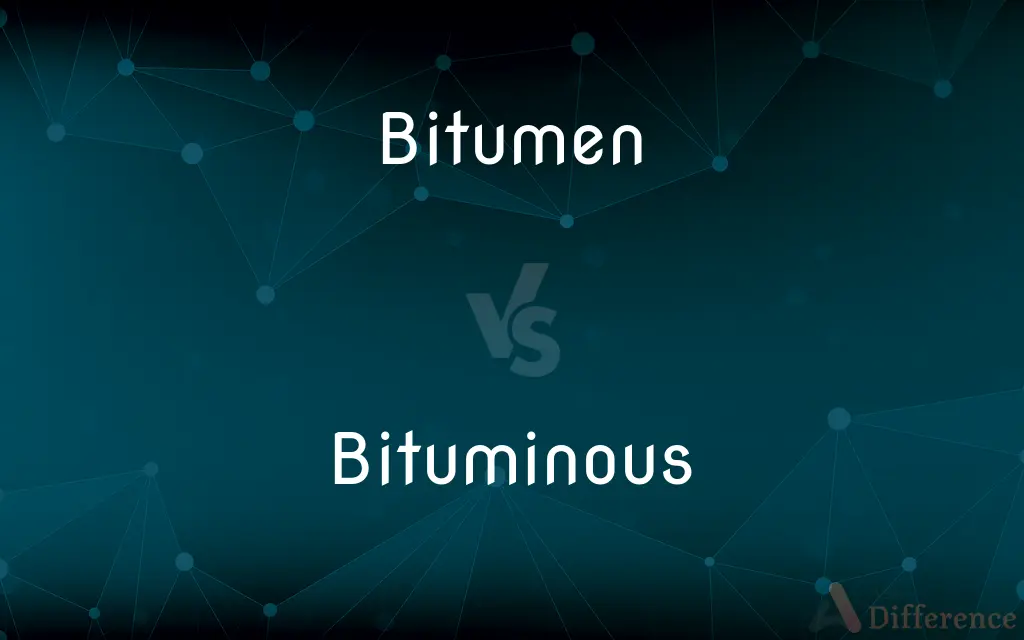Bitumen vs. Bituminous — What's the Difference?
By Tayyaba Rehman — Updated on September 24, 2023
Bitumen" is a black viscous substance used in road construction and roofing, while "Bituminous" describes materials or substances containing or resembling bitumen.

Difference Between Bitumen and Bituminous
Table of Contents
ADVERTISEMENT
Key Differences
"Bitumen" specifically denotes a semi-solid or viscous form of petroleum, which appears black or dark brown. It has a consistency akin to tar and is extensively used for road construction and some waterproofing purposes. In contrast, the word "Bituminous" serves as an adjective, illustrating items that either contain bitumen or possess its characteristics.
Exploring their use in infrastructure, "Bitumen" is the actual substance that binds the aggregates in asphalt or macadam roads. It provides a waterproof layer on structures like roofs and bridges. Conversely, "Bituminous" roads or "Bituminous" coatings suggest that bitumen plays a crucial part in their composition or finish.
For example, when referring to a road's construction material, you might specifically name "Bitumen" as the binder. But when describing the type of road or its surface, you'd label it "Bituminous." Similarly, in industrial contexts, while "Bitumen" may be purchased in barrels, a "Bituminous" mixture would indicate a combination inclusive of bitumen.
It is essential to understand the distinction between these two terms to ensure accurate communication, especially in construction and industrial scenarios. Knowing the difference assists in identifying whether the subject is the actual substance "Bitumen" or something that is "Bituminous" in nature or composition.
Comparison Chart
Meaning
A black viscous substance.
Containing or resembling bitumen.
ADVERTISEMENT
Part of Speech
Noun.
Adjective.
Usage
Refers to the substance itself.
Describes something with bitumen qualities.
Common Contexts
Road construction, roofing material.
Bituminous coal, bituminous roads.
Derivation
From the Latin "bitumen."
From "bitumen" with an adjective suffix.
Compare with Definitions
Bitumen
Waterproofing agent for structures.
They applied bitumen to the roof to prevent leaks.
Bituminous
Describing the nature of certain coals.
Bituminous coal is a primary source of energy in some regions.
Bitumen
Tar-like substance with industrial applications.
The company specializes in bitumen-based products for waterproofing.
Bituminous
Containing or related to bitumen.
The bituminous layer ensures the road's longevity.
Bitumen
Binder in asphalt or macadam.
The bitumen binds the aggregates, providing durability to the road.
Bituminous
Pertaining to materials mixed with bitumen.
Bituminous asphalt is commonly used in road construction.
Bitumen
Black viscous material used in construction.
They sourced high-quality bitumen for the new highway.
Bituminous
Resembling the properties of bitumen.
The bituminous coating provided a shiny finish to the surface.
Bitumen
A semi-solid form of petroleum.
The storage tanks were filled with bitumen awaiting transport.
Bituminous
Indicating a substance's bitumen-like quality.
The bituminous sealant worked perfectly for the project.
Bitumen
Any of various flammable mixtures of relatively nonvolatile hydrocarbons that occur naturally or are obtained by fractional distillation of petroleum. Bitumens are used for paving, roofing, and waterproofing. Also called asphalt.
Bituminous
Like or containing bitumen.
Bitumen
A sticky, black, highly viscous liquid or semi-solid form of petroleum, burning with a bright flame. It occurs as an abundant natural product in many places, as on the shores of the Dead and Caspian Seas. It is used in cements, in the construction of pavements, etc.; Mineral pitch.
Bituminous
Of or relating to bituminous coal.
Bitumen
(by extension) Any one of the natural hydrocarbons, including the hard, solid, brittle varieties called asphalt, the semisolid maltha and mineral tars, the oily petrolea, and even the light, volatile naphthas.
Bituminous
Of or pertaining to bitumen.
Bitumen
Roads sealed with bitumen, as opposed to dirt roads.
Bituminous
(uncountable) Bituminous coal.
Bitumen
(Canada) Canadian deposits of extremely heavy crude oil.
Bituminous
(countable) A type or grade of bituminous coal.
Bitumen
To cover or fill with bitumen.
Bituminous
Having the qualities of bitumen; compounded with bitumen; containing bitumen.
Near that bituminous lake where Sodom flamed.
Bitumen
Mineral pitch; a black, tarry substance, burning with a bright flame; Jew's pitch. It occurs as an abundant natural product in many places, as on the shores of the Dead and Caspian Seas. It is used in cements, in the construction of pavements, etc. See Asphalt.
Bituminous
Resembling or containing bitumen;
Bituminous coal
Bitumen
By extension, any one of the natural hydrocarbons, including the hard, solid, brittle varieties called asphalt, the semisolid maltha and mineral tars, the oily petroleums, and even the light, volatile naphthas.
Bitumen
Any of various naturally occurring impure mixtures of hydrocarbons
Common Curiosities
Can "Bitumen" be used for roofing?
Yes, bitumen is often used in waterproofing roofs.
What does "Bituminous" coal mean?
"Bituminous" coal refers to a type of coal that's soft and contains a tar-like substance called bitumen.
How is "Bituminous" paint different from regular paint?
"Bituminous" paint contains bitumen, making it waterproof and corrosion-resistant.
Is "Bitumen" natural or man-made?
Bitumen is naturally occurring, but it can also be refined from crude oil.
Is "Bitumen" the same as tar?
No, while both are black and viscous, bitumen is a petroleum product, whereas tar is derived from coal or wood.
Is every "Bituminous" product made of "Bitumen"?
Not necessarily. "Bituminous" can also mean resembling bitumen.
Why is "Bitumen" used in roads?
Bitumen serves as a binder in asphalt, making roads durable and water-resistant.
Share Your Discovery

Previous Comparison
Gravel vs. Ballast
Next Comparison
Lobola vs. DowryAuthor Spotlight
Written by
Tayyaba RehmanTayyaba Rehman is a distinguished writer, currently serving as a primary contributor to askdifference.com. As a researcher in semantics and etymology, Tayyaba's passion for the complexity of languages and their distinctions has found a perfect home on the platform. Tayyaba delves into the intricacies of language, distinguishing between commonly confused words and phrases, thereby providing clarity for readers worldwide.
















































